DFM 2016-2017 Annual Report
2016-2017 Annual Report from the Department of Family Medicine, Calgary.
2016-2017 Annual Report from the Department of Family Medicine, Calgary.
- No tags were found...
You also want an ePaper? Increase the reach of your titles
YUMPU automatically turns print PDFs into web optimized ePapers that Google loves.
A N N U A L R E P O R T 2 0 1 6 - 1 7<br />
Academic Teaching Clinic Highlights: QI Half Days<br />
Clinic team half days were held with the goal to provide an organized approach to QI in an exciting<br />
and effective format. The half days encouraged collaboration among participants, and focused time to<br />
brainstorm and develop solutions to concerns that are shared in everyday work life.<br />
CTC’s QI Half Day focused on Improvement on patient care in the Patient Medical Home. The session<br />
resulted in five clear, concise, action oriented goals to consider over the next 3-6 months:<br />
1. Potential for email communication with patients for appointment reminders<br />
2. Incorporate physician delivered telephone medicine into clinical time<br />
3. To make “rooming” of patients in clinic a priority<br />
4. Formalizing a single location to store documentation and communications that are important to all<br />
staff and stakeholders<br />
5. Group visits for patients in our Medical Home with chronic conditions<br />
Action plans designed around each of these improvement goals and next steps from this event have<br />
already been put in motion.<br />
SHC's Half Day focused on Emotional Intelligence, where issues brainstormed were brought to the<br />
Clinic Improvement Team (CIT). The CIT provided information on the Plan-Do-Act-Study (PDSA) cycle,<br />
as it related to two clinic issues: shortage of sterilized instruments, and the benefits of using E-<br />
simulation in the teaching and management of anaphylaxis in the primary care setting.<br />
The project demonstrated the importance of planning to coordinate care and treat emergencies in the<br />
primary care setting, that regular team education and E-simulation increases the knowledge and<br />
comfort in handling anaphylaxis.<br />
This type of learning involves everyone, is non-threatening, safe, and demonstrates the importance of<br />
leadership, collaboration, and ongoing QI and QA.<br />
Sunridge's QI Day reviewed patient time spent in the clinic. Through patient surveys and a room<br />
utilization study, it was determined patients were spending longer than their scheduled appointment<br />
time in the clinic. This data was used to determine areas for improvement, and the clinic has<br />
implemented several changes to clinic processes and workflows to improve the patient experience.<br />
Preliminary results show a 10% improvement in the amount of time patients wait in the clinic, as<br />
compared to the <strong>2016</strong> baseline study.<br />
Page 38


